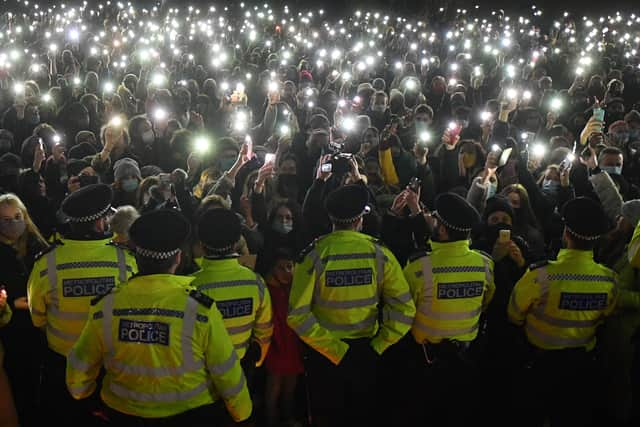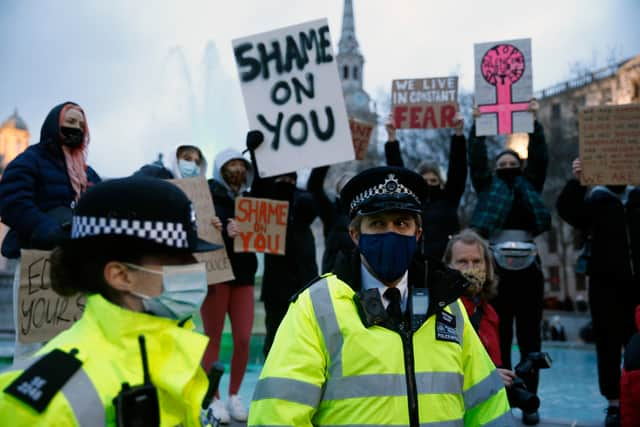‘Thousands’ of corrupt and predatory police officers may be in jobs, watchdog warns
and live on Freeview channel 276
Police officers with criminal records and organised crime links are working in forces in the UK, while “misogyny, sexism and predatory behaviour” prevails, a watchdog has warned.
Hundreds - or potentially thousands - of officers who should have failed vetting checks may be serving in England and Wales, a damning report into policing standards has revealed.
Advertisement
Hide AdAdvertisement
Hide AdAn officer convicted of indecent exposure and some from “extensive criminal” families were accepted, while others used their positions to commit “appalling crimes” against women.
Eight forces were assessed by His Majesty’s Inspectorate of Constabulary and Fire & Rescue Services (HMICFRS) and 131 vetting decisions were found “questionable at best”.
Constabulary inspector Matt Parr said: ““It is too easy for the wrong people to both join and stay in the police.”


He added: “Despite repeated warnings - including several from us - not enough has been done to improve standards and stamp out misogyny and predatory behaviour in policing.
Advertisement
Hide AdAdvertisement
Hide Ad“The police must do more to prevent unsuitable people joining, identify any misconduct within the force, and quickly dismiss officers and staff if they are not fit to serve the public.”
It comes amid a series of scandals for the Metropolitan Police, following the rape, abduction and murder of Sarah Everard by serving armed cop Wayne Couzens in March 2021 - which raised serious concerns about police vetting and recruitment.
Former commissioner Dame Cressida Dick was forced to exit her leadership role amid controversy over Couzens, the Charing Cross report into offensive WhatsApp messages, and the inquests into the victims of gay serial killer Stephen
Ongoing reviews and inquiries include the Home Office independent inquiry led by Dame Elish Angiolini; a Met Police review of culture and standards led by Baroness Louise Casey; misconduct investigations by the Independent Office for Police Conduct (IOPC) and this HMICFRS inspections of police vetting and counter-corruption procedures.
What did the report say?
Advertisement
Hide AdAdvertisement
Hide AdThe report, titled ‘An inspection of vetting, misconduct, and misogyny in the police service’, was published today (Tuesday, November 2).
As part of its inspection, HMICFRS:
- Surveyed 11,277 police officers and staff ;
- Interviewed 42 of the survey respondents;
- Examined 725 vetting files;
- And assessed 264 complaint and misconduct investigations .
Inspectors found examples of police officers transferring between forces despite a history of concerning intelligence, complaints or misconduct allegations.
Incidents which should have been assessed as gross misconduct were assessed as misconduct only, or not treated as misconduct at all, HMICFRS found.
And the inspectorate concluded “a culture of misogyny, sexism and predatory behaviour” towards female officers, staff and the public still exists and is “prevalent” in many forces.


Inspectors made 43 recommendations including:
- Updating minimum standards for pre-employment checks;
- Improving the quality and consistency of vetting decision-making;
- Extending the scope of the law on police complaint and misconduct procedures;
- Understanding and defining what constitutes misogynistic and predatory behaviour;
- Enhancing how the police collect corruption-related intelligence;
- And improving how the police assess and investigate allegations of misconduct.
Advertisement
Hide AdAdvertisement
Hide AdMr Parr said: “It seems reasonable for me to say that over the last three or four years, the number of people recruited over whom we would raise significant questions is certainly in the hundreds if not low thousands.
“We found evidence of poor decision-making, inconsistent handling of misconduct cases and a lack of effective monitoring of IT use, all of which can lead to devastating consequences.
“It is essential that police leaders act now on our recommendations. Our report highlights that they simply cannot afford to wait any longer.”
Misogyny, sexism and predatory behaviour
One of the report’s findings was of a “culture where misogyny, sexism and predatory behaviour” towards female police officers and staff and members of the public still exists.
They said this was “even prevalent” in some forces.
Advertisement
Hide AdAdvertisement
Hide AdAccounts by female officers, staff and volunteers contained sensitive details, some of which amounted to allegations of criminal offences, including sexual assault by male colleagues.
Complaints included:
- Senior male officers pursuing lower-ranked women for sex, via work emails;
- Male supervisors viewing pornography at work and on suspects phones
- Sending pornography to female colleagues’ phones;
- Inappropriate sexual comments by male officers - including about a victim’s breasts, vulnerable sex workers, and disparaging and insulting remarks about female victims;
- A senior male officer pestering female colleagues for sex at work events and seeking to “take advantage of those who he could see had clearly been drinking alcohol”;
- Male supervisors making explicit comments about female members of the public.
- And male officers stopping cars driven by “pretty” women, known as “booty patrol”.
One female senior officer told inspectors she held a folder across her chest every time she went to a meeting with a particular male colleague who “consistently stared at her breasts”.
And women said there were “huge deterrents” to reporting sexual harrassment.
Respondents told HMICFRS they were “isolated”, regarded as “troublemakers”, “labelled as a grass” and had their “name dragged through the mud rather than the offender”.
Advertisement
Hide AdAdvertisement
Hide AdOne said: “I have zero percent trust in the force - I will never report anything again. I will be hung out to dry.”
And another added: “There is no way on God’s green earth that I would report anything ever again.”
What have campaigners and charities said?
Anna Birley, co-founder of women’s rights group Reclaim These Streets, told BBC Radio Four: “This isn’t a new problem - it’s just that we’re talking about it more. I want to see massive changes.. We need to change the type of person that we recruit to policing.
“It’s a unique position of power. We need to be confident when we pick up the phone in an emergency and ask for help, the person that’s going to come isn’t a predator themselves.”
Advertisement
Hide AdAdvertisement
Hide AdMandu Reid, leader of the Women’s Equality Party, said: “So many of us have been flagging these problems for so long.
“It’s clear deep misogynistic and racist dysfunction infects and corrupts policing everywhere.”
“Women, black people, and other marginalised groups have paid a heavy price for this dereliction of duty. We’re at the point now where the whole system needs a radical overhaul.”
She added: “Policing as we know it has had its day. It’s time to reimagine public safety.”
Advertisement
Hide AdAdvertisement
Hide AdAndrea Simon, director of the End Violence Against Women Coalition (EVAW), said: “These shocking findings by the police inspectorate are the latest indictment of the state of policing.
“It is counterproductive and clearly dangerous to rush into recruiting tens of thousands of new officers when such longstanding and deeply rooted issues remain unaddressed.”
And Harriet Wistrich, from the Centre for Women’s Justice, said: “A police officer has powers and status which if misused can allow him to take advantage of vulnerable women.
“It is utterly unacceptable that there isn’t the strictest interview and vetting procedures to ensure that potential abusers are not admitted to the police.”
What have policing organisations said?
Advertisement
Hide AdAdvertisement
Hide AdMartin Hewitt, National Police Chiefs’ Council (NPCC) chairman, said the HMICFRS “agreed with 90% of vetting decisions made by forces and found 80% of misconduct investigations were effective” but insisted that the report’s “recommendations will be addressed in full”.
He said: “Chief constables will act on these recommendations and put the problems right because we cannot risk predatory or discriminatory individuals slipping through the net.
“A number of changes and actions are already underway to improve standards in vetting, misconduct and counter-corruption and ensure those standards are consistently followed.”
Andy Marsh, chief constable at the College of Policing, said: “It is essential that everyone working in policing upholds the highest professional and ethical standards.
Advertisement
Hide AdAdvertisement
Hide Ad“We will act quickly to translate these recommendations into practical guidance that furthers the high standards we set, while maintaining the ability of officers and staff, the majority of whom serve with dedication and integrity, to do their jobs, protect the public, and fight crime.
“Vetting will only ever provide a snapshot, and it must be backed up by strong leadership at all levels and people who can spot and call out behaviour which does not belong in policing.”
What have politicians said?
Home secretary Suella Braverman said the report “shines a stark light” on police vetting and called it “disappointing” that HMICFRS found “forces are taking unnecessary risks”.
She said: "I have been clear that culture and standards in the police need to change and the public’s trust in policing restored.
Advertisement
Hide AdAdvertisement
Hide Ad"Chief constables must learn these lessons and act on the findings of this report as a matter of urgency."
A spokesperson for the mayor of London said: “It is clearer than ever that change and reform are long overdue.”
He continued: “Much more must be done to detect and deal with misogynistic and predatory behaviour in all police forces to keep the public safe and restore public confidence.
“As mayor, Sadiq has taken decisive action to ensure that in London, the Met is now set on a path of far-reaching systematic and cultural reform.
Advertisement
Hide AdAdvertisement
Hide Ad“Sir Mark Rowley understands the scale of the challenge ahead - both to raise standards and restore public confidence and trust in the police. Some of that work has already begun.
“The mayor is committed to doing everything in his power to support Sir Mark to deliver the step-change in culture, systems, standards and performance that’s so desperately needed.”
Assistant Met Police commissioner Barbara Gray said: “Being ruthless in ridding the Met of those who corrupt our integrity is central to commissioner Sir Mark Rowley’s vision of reform.
“We will succeed with the vast majority of our honest and dedicated officers and staff.”
